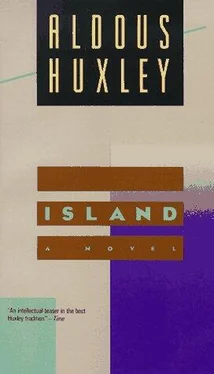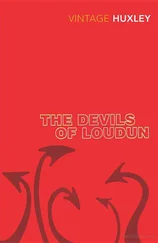Aldous Huxley - Island
Здесь есть возможность читать онлайн «Aldous Huxley - Island» весь текст электронной книги совершенно бесплатно (целиком полную версию без сокращений). В некоторых случаях можно слушать аудио, скачать через торрент в формате fb2 и присутствует краткое содержание. Жанр: Социально-психологическая фантастика, на английском языке. Описание произведения, (предисловие) а так же отзывы посетителей доступны на портале библиотеки ЛибКат.
- Название:Island
- Автор:
- Жанр:
- Год:неизвестен
- ISBN:нет данных
- Рейтинг книги:3 / 5. Голосов: 1
-
Избранное:Добавить в избранное
- Отзывы:
-
Ваша оценка:
- 60
- 1
- 2
- 3
- 4
- 5
Island: краткое содержание, описание и аннотация
Предлагаем к чтению аннотацию, описание, краткое содержание или предисловие (зависит от того, что написал сам автор книги «Island»). Если вы не нашли необходимую информацию о книге — напишите в комментариях, мы постараемся отыскать её.
Island — читать онлайн бесплатно полную книгу (весь текст) целиком
Ниже представлен текст книги, разбитый по страницам. Система сохранения места последней прочитанной страницы, позволяет с удобством читать онлайн бесплатно книгу «Island», без необходимости каждый раз заново искать на чём Вы остановились. Поставьте закладку, и сможете в любой момент перейти на страницу, на которой закончили чтение.
Интервал:
Закладка:
"It's like a Logical Positivist," he said. "What is?"
"That harpsichord."
Like a Logical Positivist, he was thinking in the shallows of his mind, while in the depths the great Event of light and sound tunelessly unfolded. Like a Logical Positivist talking about Ploti-nus and Julie de Lespinasse.
The music changed again, and now it was the violin that sus tained (how passionately!) the long-drawn note of contempla tion, while the two recorders took up the theme of active involvement and repeated it-the identical form imposed upon another substance-in the mode of detachment. And here, dancing in and out between them, was the Logical Positivist, absurd but indispensable, trying to explain, in a language incommensurable with the facts, what is was all about.
In the Eternity that was as real as shit, he went on listening to these interwoven streams of sound, went on looking at these interwoven streams of light, went on actually being (out there, in here, and nowhere) all that he saw and heard. And now, abruptly, the character of the light underwent a change. These interwoven streams, which were the first fluid differentiations of an understanding on the further side of all particular knowledge, had ceased to be a continuum. Instead, there was, all of a sudden, this endless succession of separate forms-forms still manifestly charged with the luminous bliss of undifferentiated being, but limited now, isolated, individualized. Silver and rose, yellow and pale green and gentian blue, an endless succession of luminous spheres came swimming up from some hidden source of forms and, in time with the music, purposefully constellated themselves into arrays of unbelievable complexity and beauty. An inexhaustible fountain that sprayed out into conscious pattern-ings, into lattices of living stars. And as he looked at them, as he lived their life and the life of this music that was their equivalent, they went on growing into other lattices that filled the three dimensions of an inner space and changed incessantly in another, timeless dimension of quality and significance.
"What are you hearing?" Susila asked.
"Hearing what I see," he answered. "And seeing what I hear."
"And how would you describe it?"
"What it looks like," Will answered, after a long silence, "what it sounds like, is the creation. Only it's not a one-shot affair. It's nonstop, perpetual creation."
"Perpetual creation out of no-what nowhere into something somewhere-is that it?"
"That's it."
"You're making progress."
If words had come more easily and, when spoken, had been a little less pointless, Will would have explained to her that knowl-edgeless understanding and luminous bliss were a damn sight better than even Johann Sebastian Bach.
"Making progress," Susila repeated. "But you've still got a long way to go. What about opening your eyes?"
Will shook his head emphatically.
"It's time you gave yourself a chance of discovering what's what."
"What's what is this" he muttered.
"It isn't," she assured him. "All you've been seeing and hearing and being is only the first what. Now you must look at the second one. Look, and then bring the two together into a single inclusive what's-what. So open your eyes, Will. Open them wide."
"All right," he said at last and reluctantly, with an apprehensive sense of impending misfortune, he opened his eyes. The inner illumination was swallowed up in another kind of light. The fountain of forms, the colored orbs in their conscious arrays and purposefully changing lattices gave place to a static composition of uprights and diagonals, of flat planes and curving cylinders, all carved out of some material that looked like living agate, and all emerging from a matrix of living and pulsating mother-of-pearl. Like a blind man newly healed and confronted for the first time by the mystery of light and color, he stared in uncomprehending astonishment. And then, at the end of another twenty timeless bars of the Fourth Brandenburg, a bubble of explanation rose into consciousness. He was looking, Will suddenly perceived, at a small square table, and beyond the table at a rocking chair, and beyond the rocking chair at a blank wall of whitewashed plaster. The explanation was reassuring for in the eternity that he had experienced between the opening of his eyes and the emergent knowledge of what he was looking at, the mystery confronting him had deepened from inexplicable beauty to a consummation of shining alienness that filled him, as he looked, with a kind of metaphysical terror. Well, this terrifying mystery consisted of nothing but two pieces of furniture and an expanse of wall. The fear was allayed, but the wonder only increased. How was it possible that things so familiar and commonplace could be this? Obviously it wasn't possible; and yet there it was, there it was.
His attention shifted from the geometrical constructions in brown agate to their pearly background. Its name, he knew, was "wall"; but in experienced fact it was a living process, a continuing series of transubstantiations from plaster and whitewash into the stuff of a supernatural body-into a god-flesh that kept modulating, as he looked at it, from glory to glory. Out of what the word bubbles had tried to explain away as mere calcimine some shaping spirit was evoking an endless succession of the most delicately discriminated hues, at once faint and intense, that emerged out of latency and went flushing across the god-body's divinely radiant skin. Wonderful, wonderful! And there must be other miracles, new worlds to conquer and be conquered by. He turned his head to the left and there (appropriate words had bubbled up almost immediately) was the large marble-topped table at which they had eaten their supper. And now, thick and fast, more bubbles began to rise. This breathing apocalypse called "table" might be thought of as a picture by some mystical Cubist, some inspired Juan Gris with the soul of Traherne and a gift for painting miracles with conscious gems and the changing moods of water-lily petals.
Turning his head a little further to the left he was startled by .1 blaze of jewelry. And what strange jewelry! Narrow slabs of emerald and topaz, of ruby and sapphire and lapis lazuli, blazing away, row above row, like so many bricks in a wall of the New Jerusalem. Then-at the end, not in the beginning-came the word, in the beginning were the jewels, the stained-glass windows, the walls of paradise. It was only now, at long last, that the word "bookcase" presented itself for consideration.
Will raised his eyes from the book-jewels and found himself at the heart of a tropical landscape. Why? Where? Then he remembered that, when (in another life) he first entered the room, he had noticed, over the bookcase, a large, bad water color. Between sand dunes and clumps of palms a widening estuary receding towards the open sea, and above the horizon enormous mountains of cloud towered into a pale sky. "Feeble," came bubbling up from the shallows. The work, only too obviously, of a not very gifted amateur. But that was now beside the point, for the landscape had ceased to be a painting and was now the subject of the painting-a real river, real sea, real sand glaring in the sunshine, real trees against a real sky. Real to the nth, real to the point of absoluteness. And this real river mingling with a real sea was his own being engulfed in God. " 'God' between quotation marks?" enquired an ironical bubble. "Or God (!) in a modernist, Pickwickian sense?" Will shook his head. The answer was just plain God-the God one couldn't possibly believe in, but who was self-evidently the fact confronting him. And yet this river was still a river, this sea the Indian Ocean. Not something else in fancy dress. Unequivocally themselves. But at the same time unequivocally God.
"Where are you now?" Susila asked.
Without turning his head in her direction, Will answered, "In heaven, I suppose," and pointed at the landscape.
Читать дальшеИнтервал:
Закладка:
Похожие книги на «Island»
Представляем Вашему вниманию похожие книги на «Island» списком для выбора. Мы отобрали схожую по названию и смыслу литературу в надежде предоставить читателям больше вариантов отыскать новые, интересные, ещё непрочитанные произведения.
Обсуждение, отзывы о книге «Island» и просто собственные мнения читателей. Оставьте ваши комментарии, напишите, что Вы думаете о произведении, его смысле или главных героях. Укажите что конкретно понравилось, а что нет, и почему Вы так считаете.











